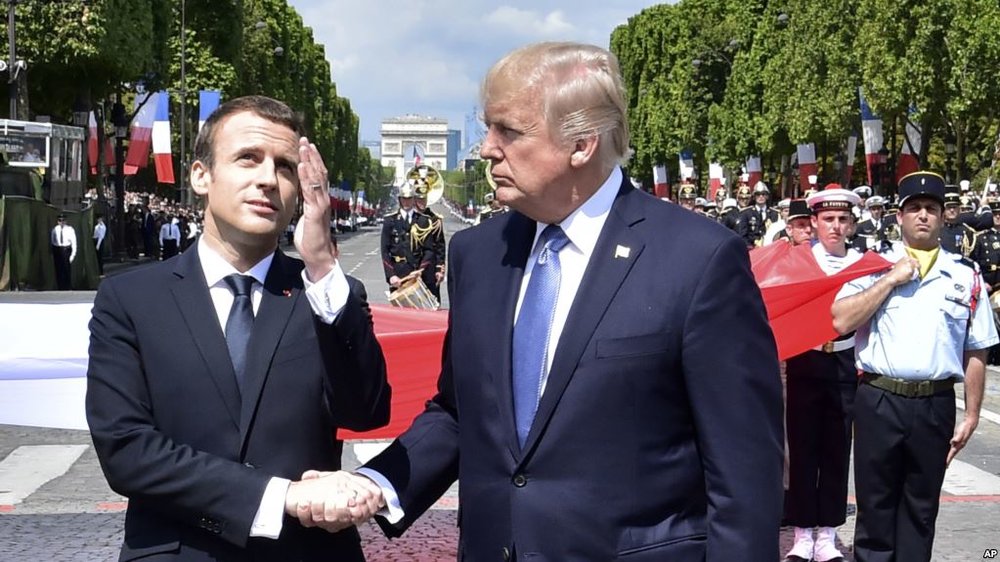The story of Elysees Palace and nuclear deal with Iran

TEHRAN - The paradoxical Macron game against a nuclear deal with Iran has reduced the credibility of Paris and its role in the international system.
Today, few speak of France as an independent player in the world, since after the end of the presidency, Jacques Chirac, all three current French presidents have become one of the White House actors in Europe. Emanuel Macron, the young and new president of France, also goes on to lead his ancestors. He was the main European politician who agreed to "change the nuclear deal with Iran" with the request of Trump. Macron Trump and Netanyahu (prime minister of the occupation regime of Jerusalem) promised to meet all their demands for a nuclear deal. Undoubtedly, this French attitude was contrary to their obligations in the international system.
It was for the first time that "Emanuel Macron" the French President, insisted that the nuclear deal could be amended in some parts, including Iran's missile power and the introduction of new time limits (after 2025). During the meeting between Macron and Trump in New York (2017) and on the sidelines of the United Nations General Assembly, France's opposition to the Joint Comprehensive Plan of Action (JCPOA) and the Islamic Republic of Iran became more and more evident. In the joint project conducted by the White House and the Elysee Palace, the French are tasked with focusing on Iran's missile power, providing the ground for simultaneous restriction of Iran's nuclear and missile capabilities.In other words, Paris main goal here was to link Iran's missile program to the JCPOA and turn the existing equation to a two variable equation. In their latest position against Iran, the French have accused our country of violating United Nations Security Council Resolution 2231. The French authorities have also explicitly stated that the use of ballistic missiles by the Islamic Republic of Iran is unacceptable and that it should be negotiated with Tehran.
Today, after the departure of the United States of America from a nuclear deal with Iran, Macron continues to play its paradoxical game with Iran. He argued last week that a more complete agreement with Iran (including missile and regional concerns) would be inevitable. However, the French President during a meeting with the Russian president has emphasized the adherence to the current nuclear deal!
At a recent meeting between the Russian and French presidents, Putin stated:
we can not make preserving the Iranian nuclear deal dependent on these three parameters because if we do, it means that we too are withdrawing from the accord because the deal that exists foresees no additional conditions.”
As reuters reported, A Macron adviser hailed Putin’s comments as a “key” point of convergence between Paris and Moscow as the Trump administration urges its European allies to sever economic ties with Iran.
After talks that ran long over schedule, Macron and Trump entered the news conference looking relaxed and smiling. Macron acknowledged Paris and Moscow disagreed on a range of issues but called for “strong multilateralism”.
Another point is that in this equation, the main difference between the French and the American officials is the "tactic employed" by the White House and the Elysee Palace. Since the presidential campaigns of 2016, the JCPOA was called "the worst deal ever" by Trump and called for "changing" it or "withdraw" from it. However, the French have chosen the policy of "playing with ambiguous words". The vocabulary used by the French authorities is wider than Americans in this regard: from "commitment to the JCPOA" to "completing the JCPOA"! Therefore, the French game is more complicated than that by Americans. Many analysts of international affairs believe that France hasn't played a transparent game considering the nuclear accord. Sometimes it is said that this lack of transparency is due to the French's confusion over Iran's nuclear deal, but by looking at the positions of the American and French officials towards the JCPOA, we can clearly see that they're trying to complete the same puzzle in opposition to Iran.
Ultimately, the actions of French President Emmanuel Macron and other officials of the country, in contrast to the nuclear deal, will never be a reminder of the Iranian nation. Obviously, in the event of a complete cancellation of the nuclear deal, there will be no difference between the presidents of the United States and France.
Leave a Comment